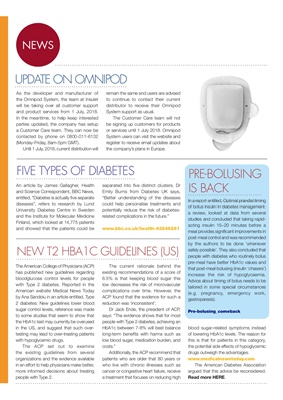
NEWS
UPDATE ON OMNIPOD
FIVE TYPES OF DIABETES
NEW T2 HBA1C GUIDELINES (US)
As the developer and manufacturer of the
Omnipod System, the team at Insulet will
be taking over all customer support and
product services from 1 July, 2018. In the
meantime, to help keep your members
updated, the company has setup a
Customer Care team. They can now be
contacted by phone on 0800-011-6132
(Monday-Friday, 8am-5pm GMT).
Until 1 July, 2018, current distribution will
remain the same and users are advised
to continue to contact their current
distributor to receive their Omnipod
System support as usual.
The Customer Care team will not
be signing up customers for products
or services until 1 July 2018. Omnipod
System users can visit the website and
register to receive email updates about
the company's plans in Europe.
An article by James Gallagher Health
and science correspondent, BBC News,
entitled, "Diabetes is actually five separate
diseases", refers to research by Lund
University Diabetes Centre in Sweden
and the Institute for Molecular Medicine
Finland, which looked at 14,775 patients
and showed that the patients could be
separated into five distinct clusters. Dr
Emily Burns from Diabetes UK says,
"Better understanding of the diseases
could help personalise treatments and
potentially reduce the risk of diabetesrelated
complications in the future."
www.bbc.co.uk/health-43246261
The American College of Physicians (ACP)
has published new guidelines regarding
bloodglucose control levels for people
with Type 2 diabetes. Reported in the
American website Medical News Today
by Ana Sandoiu in an article entitled, Type
2 diabetes: New guidelines lower blood
sugar control levels, reference was made
to some studies that seem to show that
the HbA1c test may currently be overused
in the US, and suggest that such overtesting may lead to over-treating
patients
with hypoglycemic drugs.
The ACP set out to examine
the existing guidelines from several
organizations and the evidence available
in an effort to help physicians make better,
more informed decisions about treating
people with Type 2.
The current rationale behind the
existing recommendations of a score of
6.5% is that keeping blood sugar this
low decreases the risk of microvascular
complications over time. However, the
ACP found that the evidence for such a
reduction was 'inconsistent'.
Dr Jack Ende, the president of ACP,
says: "The evidence shows that for most
people with Type 2 diabetes, achieving an
HbA1c between 7-8% will best balance
long-term benefits with harms such as
low blood sugar, medication burden, and
costs."
Additionally, the ACP recommend that
patients who are older that 80 years or
who live with chronic illnesses such as
cancer or congestive heart failure, receive
a treatment that focuses on reducing high
blood sugar-related symptoms instead
of lowering HbA1c levels. The reason for
this is that for patients in this category,
the potential side effects of hypoglycemic
drugs outweigh the advantages.
www.medicalnewstoday.com
The American Diabetes Association
argued that this advice be reconsidered.
Read more HERE.
PRE-BOLUSING
IS BACK
In a report entitled, Optimal prandial timing
of bolus insulin in diabetes management:
a review, looked at data from several
studies and concluded that taking rapidacting insulin 15-20 minutes before
a
meal provides significant improvements in
post-meal control and was recommend
by the authors to be done 'whenever
safely possible'. They also concluded that
people with diabetes who routinely bolus
pre-meal have better HbA1c values and
that post-meal bolusing (insulin 'chasers')
increase the risk of hypoglycaemia.
Advice about timing of bolus needs to be
tailored in some special circumstances
(e.g. pregnancy, emergency work,
gastroparesis).
Pre-bolusing_comeback